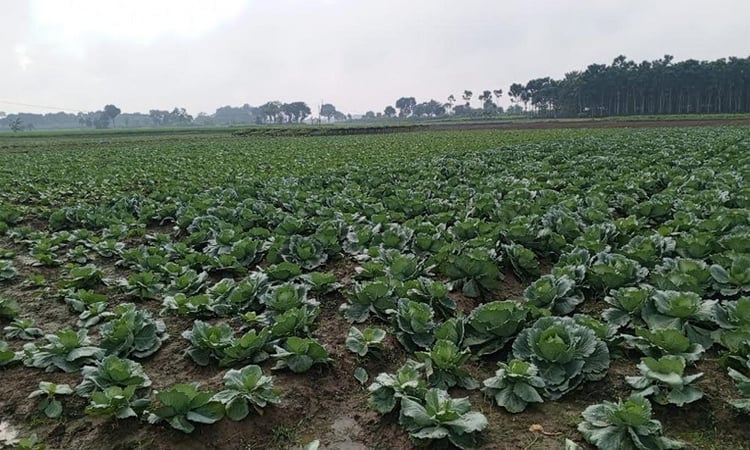News Flash
News Flash

By Bipul Ashraf
CHUADANGA, Nov 2, 2025 (BSS) - Farmers in all four upazilas of Chuadanga district are passing busy days cultivating winter vegetables. Various local winter vegetables have already started appearing in the market.
According to the Department of Agricultural Extension (DAE), Chuadanga, utmost emphasis is being given to the production of safe vegetables. This Rabi season, a target has been set to cultivate vegetables on 8,640 hectares of land across the district.
While talking to several farmers, it was revealed that they are increasingly interested in vegetable cultivation because it brings quick profits and ensures regular cash income.
Already, various winter vegetables like cauliflower, cabbage, eggplant, tomato, potato, carrot, cucumber, beans, spinach, broccoli, radish, bottle gourd, and chili are being harvested in the district.
Though winter vegetable yields in Chuadanga are usually very good, the ongoing fertilizer shortage has created concern among farmers. They fear the production may not reach expected levels unless the supply meets the demand.
However, officials from the agricultural department said that the amount of fertilizer currently in stock is sufficient to meet the target, and if applied properly, yields will be even better. They advised farmers not to overuse fertilizer and to ensure proper crop care.
According to DAE sources, the current fertilizer stock in Chuadanga includes Urea: 3,788 metric tons, TSP 219 metric tons, DAP 605 metric tons and MOP 1,258 metric tons.
Alongside winter vegetables, other crops are also being cultivated during this Rabi season.
Sources added that this year, 932 hectares of land have been targeted for wheat, 47,755 hectares for maize, and 2,020 hectares for potatoes. So far, maize has been cultivated on 1,200 hectares, potatoes on 30 hectares, and vegetables on 710 hectares. The remaining land will be cultivated gradually. Due to losses from maize and potato farming last year, farmers have reduced cultivation of those crops this season and shifted more toward vegetables.
In addition, cultivation targets include chickpeas on 6 hectares of lands, grass peas on 24 hectares, sugarcane on 1,144 hectares, onion on 1,535 hectares, lentil on 293 hectares, peas on 47 hectares, mustard on 3,715 hectares, sunflower on 4 hectares, garlic on 305 hectares, chili on 857 hectares, coriander on 473 hectares, flowers on 59 hectares, betel leaf on 1,264 hectares and tobacco on 310 hectares.
Shahjahan, a farmer from Dhutarhat village in Chuadanga Sadar upazila, said, “I have cultivated vegetables on four bighas of land. I have already planted bottle gourd, cucumber, ladies fingers, and eggplant. I grow vegetables every year, but if fertilizers are insufficient, the yield won’t be good. Winter vegetables require a lot of chemical fertilizer. If fertilizer supply remains steady, yields will be much better.”
Another vegetable farmer, Kador Ali, said, “This year, I’ve cultivated cauliflower on about two bighas of land. The yield looks good so far, but some plants have been affected by fungal diseases, for which I’m taking preventive measures. However, we’re not getting fertilizers in required quantities. Locally produced TSP and DAP are almost unavailable in the market, and where they’re available, prices are very high.”
He added that locally produced TSP fertilizer, previously priced at Tk 27 per kg, is being sold at Tk 48, and DAP, previously priced at Tk 21 per kg, is being sold for Tk 30–32.
“We often have to stand in line from early morning to buy fertilizer from dealers, yet still can’t get enough. If this shortage is resolved, yields will definitely improve.”
Chuadanga Sadar Upazila Agriculture Officer Md. Anisur Rahman told BSS, “The soil of Chuadanga is naturally very fertile and rich in phosphorus and TSP. However, many farmers are overusing fertilizers, which damages soil fertility. If farmers apply the right amount of both chemical and organic fertilizers, they’ll get much better yields. We’re urging them to avoid excessive fertilizer use.”
The district’s DAE Deputy Director Md. Masudur Rahman Sarkar told BSS, “There is an adequate stock of fertilizers in Chuadanga. To achieve good yields, farmers must apply fertilizers in the right amounts. Currently, the soil contains around 65 percent phosphorus. Overuse of chemical fertilizers poses a risk to soil health. Balanced use of fertilizers greatly enhances productivity. If farmers become more aware of this, the soil quality will continue to improve.”
He added that winter vegetable cultivation takes place every year in Chuadanga, and this year, 8,640 hectares have been brought under winter vegetable farming, along with large-scale maize cultivation.